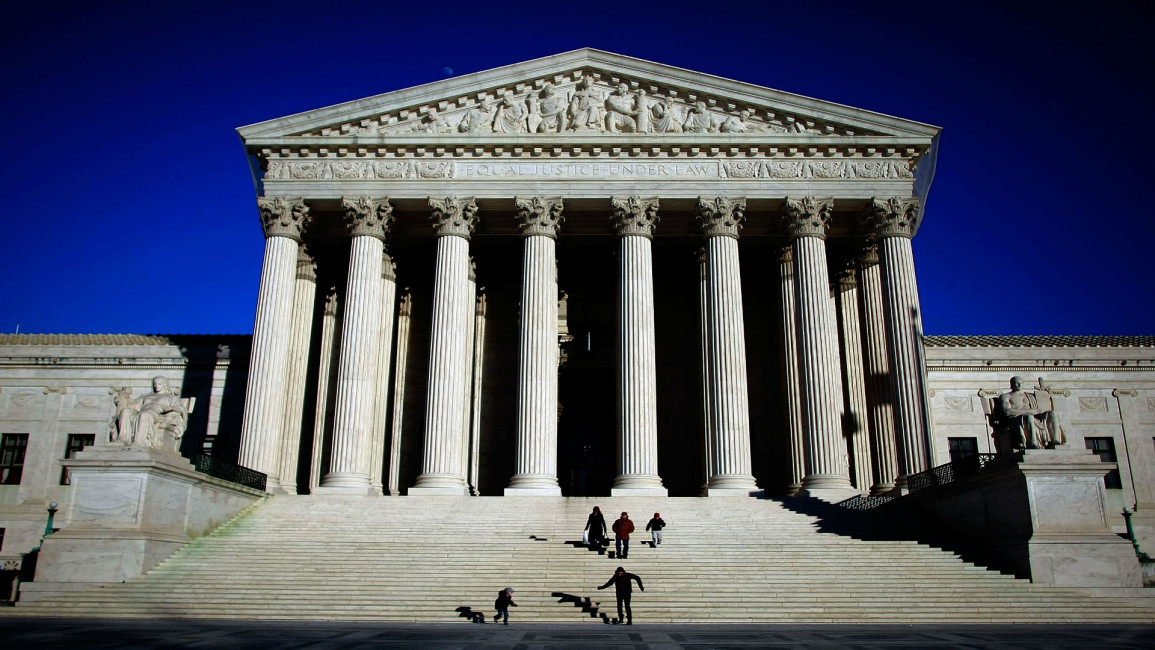US Supreme Court declines to review anti-BDS state law, leaving it in place
The US Supreme Court has declined to review an Arkansas state law forcing contractors to pledge not to boycott Israel, leaving the anti-BDS state law to stay in place.
Tuesday's decision has long been expected from the country's conservative-majority top court, causing concern among rights advocates over what this means for free speech's future and the right to boycott.
This right has long been largely seen to be implicitly protected under the US constitution's first amendment guaranteeing free speech.
"The right to free speech includes the right to participate in political boycotts. America was founded on political boycotts, and boycotts are a powerful way to speak and create change," said Holly Dickson, executive director of the American Civil Liberties Union of Arkansas, in a public statement.
"This state legislative majority wanted the government to have the power to force people to relinquish their First Amendment rights or pay a penalty, and that is a dangerous step backwards for our rights," Dickson said.
Over the past several years, rights advocates have been raising concerns over the broader implications of anti-BDS state laws, which now number more than 30, saying these laws could have effects beyond the Palestinian Boycott Divestment and Sanctions movement.
The slew of anti-BDS state legislation began in Arkansas, a rural southern state with no significant connection with the Middle East.
Nevertheless, The Arkansas Times was penalised when its publisher refused to pledge that they would not boycott Israel, even if it would mean losing advertising revenue.
These anti-BDS measures, some warn, could affect similar tactics being used by activists to protest the fossil fuel industry, the gun industry, and other contentious corporate or human rights practices.
The Eighth Circuit, which covers seven states, including Arkansas, had previously ruled the law violated the first amendment protecting free speech, including the right to boycott. But in June, the Eighth Circuit reversed the ruling. Tuesday's decision by the Supreme Court to not review the case from Arkansas allows the state law to stand.
"It's predictable news. Who knows what the logic is? A key problem I see is that it's a matter of defining what constitutes a violation," Ronald Stockton, a professor of political science at the University of Michigan-Dearborn, told The New Arab.
"Do citizens lose their rights because of pressure from the state legislature? The second issue is that this is non-violent resistance. I'd rather see non-violent resistance than what we see every day in Israel. Maybe a little bit of pressure would be a good thing," he said. He added that he expects the ACLU to continue with their fight on this case, which the group vowed to do on Tuesday.
"From the Boston Tea Party to the Montgomery Bus Boycott to the boycott of apartheid South Africa, Americans have proudly exercised that right to make their voices heard," said Brian Hauss, senior staff attorney with the ACLU Speech, Privacy, and Technology Project.
"But if states can suppress boycotts of Israel, then they can suppress boycotts of the National Rifle Association or Planned Parenthood. While we are disappointed with the result in this case, the ACLU will continue to defend the right to boycott in courts and legislatures throughout the country," Hauss added.



